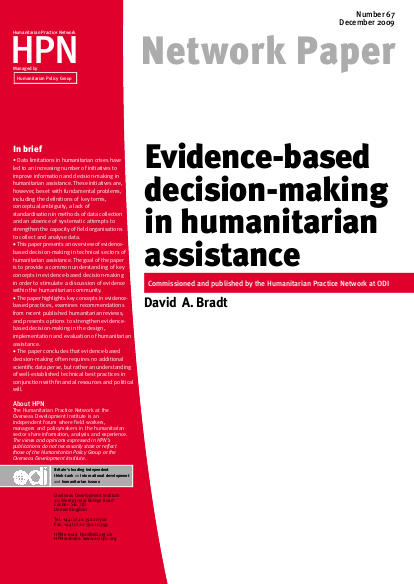
In brief • Data limitations in humanitarian crises have led to an increasing number of initiatives to improve information and decision-making in humanitarian assistance. These initiatives are, however, beset with fundamental problems, including the definitions of key terms, conceptual ambiguity, a lack of standardisation in methods of data collection and an absence of systematic attempts to strengthen the capacity of field organisations to collect and analyse data. • This paper presents an overview of evidencebased decision-making in technical sectors of humanitarian assistance. The goal of the paper is to provide a common understanding of key concepts in evidence-based decision-making in order to stimulate a discussion of evidence within the humanitarian community. • The paper highlights key concepts in evidencebased practices, examines recommendations from recent published humanitarian reviews, and presents options to strengthen evidencebased decision-making in the design, implementation and evaluation of humanitarian assistance. • The paper concludes that evidence-based decision-making often requires no additional scientific data per se, but rather an understanding of well-established technical best practices in conjunction with financial resources and political will.
Resource collections
- Coordination
- Topics
- UN Habitat - Urban Response Collection
- Urban Response - Urban Crisis Preparedness and Risk Reduction
- Urban Response Collection - Community Engagement and Social Cohesion
- Urban Response Collection - Economic Recovery
- Urban Response Collection - Environment and Climate Change
- Urban Response Collection - Housing, Land and Property
- Urban Response Collection - Urban Crisis Response, Recovery and Reconstruction
- Urban Response Collection - Urban Resilience
